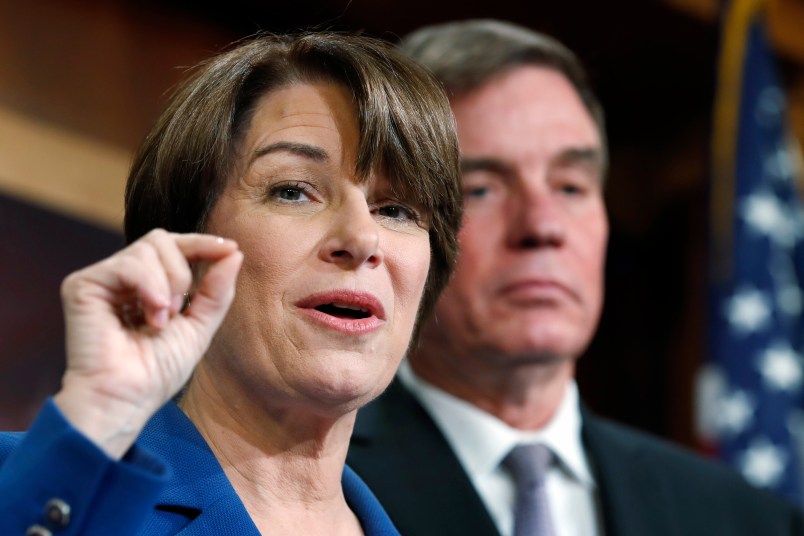WASHINGTON (AP) — House and Senate negotiators have reached an agreement on a bill to overhaul the process for handling sexual misconduct allegations in Congress.
The bill updates the decades-old Congressional Accountability Act, which governs how lawmakers and aides report sexual misconduct claims. The law has been widely criticized as confusing, cumbersome and unfair to victims of harassment and abuse.
The push for the legislation took on new urgency in the past year, as more than a half-dozen lawmakers resigned amid allegations of sexual misconduct and Capitol Hill found itself squarely at the center of the growing #MeToo movement.
Both chambers passed their own versions of the bill earlier in the year. But negotiations dragged on for more than six months as lawmakers tried to reconcile them. The sticking points included a $300,000 cap for lawmaker liability in the Senate’s version.
The language of the bill had not been released as of Wednesday evening. But according to the Senate Rules Committee, it holds lawmakers, including those who leave office, financially liable for settlements resulting from all types of harassment and retaliation, but doesn’t cover discrimination claims. It also eliminates mandatory counseling, mediation and the “cooling off” period victims are currently required to wait before filing a lawsuit or requesting an administrative hearing.
The bill requires public reporting of settlements, including identifying lawmakers who are personally liable, and extends protections to include interns, fellows and other staff.
House staffers will have access to legal representation, while Senate staffers will be given access to a confidential advocate able to offer legal advice but not act as a representative.
The deal was announced just days before the end of the legislative calendar.
“A lot of this was our belief that we had an obligation to fix this ourselves, and while I have no doubt a new Congress could have gotten it done I think we needed to fix the mess,” said Sen. Amy Klobuchar, D-Minn., the Senate bill’s sponsor. “The focus was to make sure we had a system that protected victims and not politicians.”
The final bill doesn’t include some House measures, including making lawmakers liable for discrimination settlements and requiring an independent investigation into harassment complaints at the beginning of the process.
But Rep. Jackie Speier, D-Calif., says she’s working with House Democrats and Republicans to introduce a separate bill next Congress to address those issues. Speier became a poster child for the #MeToo movement and champion of anti-harassment legislation on Capitol Hill after sharing her own story of being sexually assaulted by a high-ranking aide when she was a young staffer.
“Having spoken with many survivors, the process of going up against a lawyer for the institution and the harasser was as traumatic, if not more traumatic, than the abuse they suffered,” Speier said. “The House has remained focused on taking a system rigged in favor of the harassers and making it more victim-centric. We are committed to offering victims the tools they need to pursue justice. We will address these issues in the next Congress.”
House Speaker Paul Ryan, R-Wis., and Democratic leader Nancy Pelosi, D-Calif., along with Committee on House Administration leadership, released a joint statement Wednesday praising the bill but acknowledging that more work lies ahead.
“The agreement reflects the first set of comprehensive reforms that have been made to the Congressional Accountability Act since 1995,” it reads. “We believe this is a strong step toward creating a new standard in Congress that will set a positive example in our nation, but there is still more work to be done.”
The statement says members of both caucuses “remain committed to working in a bipartisan manner to address outstanding issues.”







However , Politicians will still get around it with their usual pizzazz .
I guess the Republican controlled Congress felt they needed something passed before they were gone.
OT- But for those people who express concern over the creation of a permanent political class who then segue into lobbying, and the alienation of our elected representatives from the people, it sort of speaks volumes that being a staffer in high school and or college is an established and necessary gateway filter for people aspiring to congress. I wonder how many of our congresspeople have pursued those gateway jobs. From my college experience (back in the Industrial Age 1970s) where all the HS Student Government types were congressional interns, it might be that the process of filling them could use some media and public scrutiny.
If I recall correctly, just recently Rob Porter’s progress through these gate ways was interrupted, much to Orrin Hatch’s dispeleasure. Hatch had given Porter an aide job, passed him on to the Utah Junior Senator to burnish his resume, and then embedded him in the Trump White House. Hatch had also actively squelched Porter’s ex wives’ battering allegations, and accused them of lying and destroying poor Rob Porter’s future.
I’m still trying to figure out why/how taxpayers are on the hook for paying compensation to a victim for the actions of a member of Congress?
This law, if it’s even intelligible, is certain to require nothing of anyone and protect everyone from nothing. The clowns in the house couldn’t get a paint by numbers right. Why even report on them.